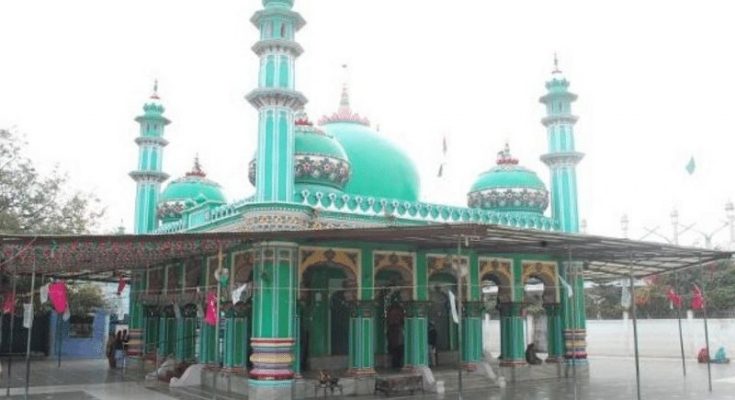#Muharram, #HussainTekri, #Religion, #India, #IndianDiversity
IBNS-CMEDIA: Deep in the heartland of Madhya Pradesh, nestled among the undulating hills and verdant landscapes, lies a small village whose name resonates with reverence and devotion: Hussain Tekri.
This unassuming village, located near the town of Dewas, holds a profound significance for Muslims across India, particularly during the sacred month of Muharram. Muharram, the first month of the Islamic calendar, begins on Sunday (July 7).
Hussain Tekri derives its name from the renowned shrine dedicated to Hazrat Imam Hussain, the grandson of Prophet Muhammad. This shrine, adorned with intricate Islamic architecture and nestled amidst serene surroundings, serves as a focal point for the annual Muharram observances.
The history of Hussain Tekri is intertwined with the legacy of Hazrat Imam Hussain and the tragic events of Karbala, where he valiantly sacrificed his life for the principles of justice and righteousness.
Muharram marks the beginning of the Islamic lunar calendar and holds immense religious significance for Muslims worldwide. It is during this month that the martyrdom of Hazrat Imam Hussain and his companions at the Battle of Karbala in 680 AD is commemorated. The events of Karbala are deeply ingrained in the collective memory of Muslims, serving as a poignant reminder of steadfastness in the face of tyranny and oppression.

In Hussain Tekri, the observance of Muharram unfolds as a solemn yet deeply spiritual affair. The month-long period is marked by various rituals and ceremonies that symbolize mourning and remembrance. Devotees, clad in black attire, gather at the shrine and participate in processions (juloos) where they recite elegies (marsiyas) and beat their chests in grief over the martyrdom of Imam Hussain.
The atmosphere reverberates with the poignant chants of “Ya Hussain” (O Hussain), echoing the heartfelt sorrow and reverence felt by all present.
Beyond its religious significance, Hussain Tekri embodies the spirit of communal harmony and hospitality. During Muharram, the village opens its doors to people from all walks of life, irrespective of caste, creed, or religion. Local residents generously offer food (tabarruk) and accommodations to pilgrims, reflecting the principles of generosity and compassion that are central to Islamic teachings.
This act of communal sharing fosters a sense of unity and solidarity among attendees, reinforcing the bonds of brotherhood and sisterhood that transcend cultural and social boundaries.
The traditions observed at Hussain Tekri are not merely religious rituals but also cultural expressions that have been preserved and passed down through generations. The intricate recitations of marsiyas and the rhythmic beats of dhol (drums) during processions highlight the rich cultural heritage of the region.
These traditions serve to connect present-day devotees with their historical roots and imbue their religious practices with a sense of continuity and authenticity.
As custodians of this rich cultural and religious legacy, the residents of Hussain Tekri strive to preserve and propagate the traditions associated with Muharram. Efforts are made year-round to maintain the shrine and its surroundings, ensuring that it remains a sacred space for generations to come. The annual observances of Muharram serve not only as a time of mourning and reflection but also as a source of spiritual rejuvenation and communal solidarity for Muslims in Madhya Pradesh and beyond.
Each year, Hussain Tekri faces challenges such as logistical arrangements for accommodating large numbers of pilgrims and ensuring the smooth conduct of processions amidst evolving societal and environmental factors. However, the community’s resilience and commitment to upholding the sanctity of Muharram remained unwavering, demonstrating their dedication to preserving this sacred tradition.
As Hussain Tekri looks to the future, the village remains steadfast in its commitment to maintaining its role as a center of spiritual devotion and cultural heritage. The annual observances of Muharram continue to serve as a time for Muslims to reaffirm their faith, commemorate historical sacrifices, and strengthen bonds of community and compassion.
Hussain Tekri will undoubtedly continue to inspire and unite believers in their shared reverence for Hazrat Imam Hussain and the enduring values he symbolizes.
In conclusion, Hussain Tekri stands as a testament to the enduring power of faith, tradition, and community spirit. Its annual Muharram celebrations not only commemorate a historical event but also reaffirm the values of courage, sacrifice, and compassion exemplified by Hazrat Imam Hussain.
As pilgrims gather each year at this sacred site, they find solace and inspiration amidst the serene surroundings of Hussain Tekri, forging bonds of unity and reverence that transcend the boundaries of time and space.





